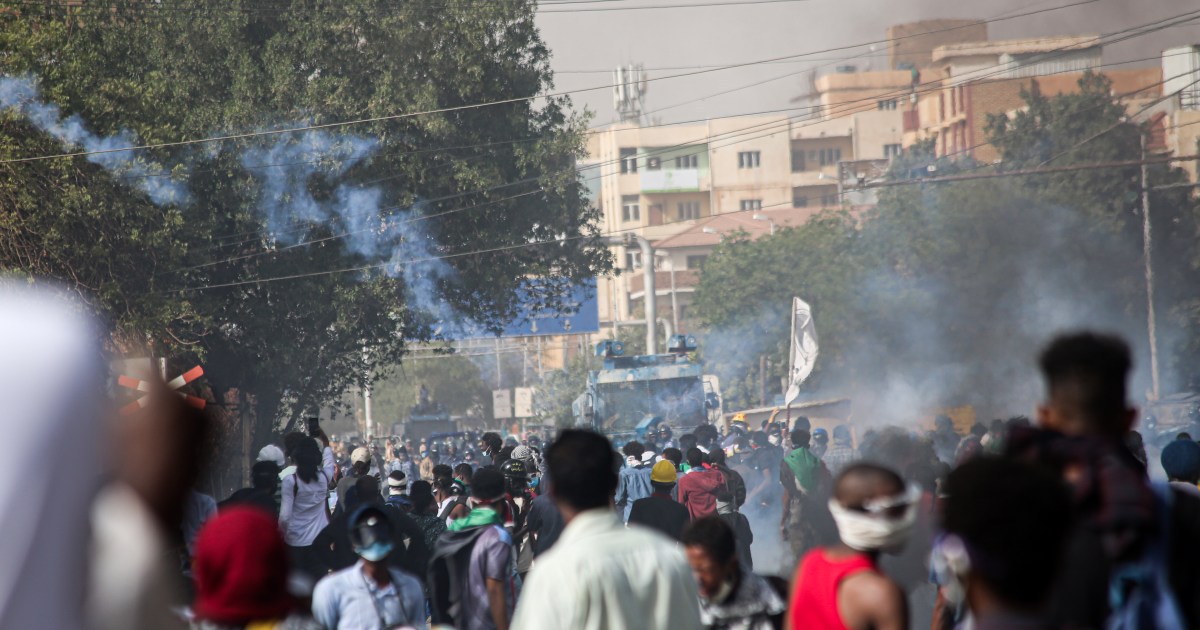Today, Sunday, dozens of Sudanese organized protest vigils in 3 cities in the center of the country, denouncing the suppression of the demonstrations, and calling for civilian rule. in the country.
And Anadolu Agency reported, quoting witnesses, that dozens gathered today in front of the house of a protest victim in the city of Madani (central country), chanting slogans condemning the suppression of the demonstrators.
Dozens also participated in a protest sit-in east of the capital, denouncing the violence, repression and arrests of demonstrators. Dozens of pharmacists in Wad Madani organized a vigil in the center of the city, according to the statement of the Central Sudan Pharmacists Committee, which said that the protest falls within the rejection of the "military coup and violence against civilians and revolutionaries."
In the city of Al-Manaqil (center), dozens of lawyers participated in a protest stand, rejecting and denouncing the killing, repression and violation of the law practiced by the security forces.
human rights protest
And earlier today, dozens of human rights defenders and advisers working at the Ministry of Justice participated in a vigil in Khartoum, refusing to kill demonstrators during the protests.
And during the demonstrations last Monday, 7 people were killed and dozens were wounded, before the death of an eighth protester from his injury last Friday, which raised the death toll from the protests since October 25 to 73, according to the (non-governmental) Sudan Doctors Committee.
In a related context, the resistance committees (consisting of activists) announced today in a statement that the schedule begins today with night demonstrations in the neighborhoods, and tomorrow by closing the streets in Khartoum, followed by a demonstration described by the committees as one million tomorrow, to organize protest vigils on Wednesday.
She added that Thursday will be for the demonstrations of the committees' coordination in Khartoum, and Friday "will witness addresses in mosques to enlighten the current political situation," and the following day, night demonstrations in the neighborhoods, to organize a "million" demonstration next Sunday.
Since last October 25, Sudan has witnessed protests in response to exceptional measures taken by the army chief, Abdel Fattah Al-Burhan, most notably the imposition of a state of emergency and the dissolution of the Sovereignty Councils and the Transitional Ministers, which political forces consider a "military coup" in exchange for the army's denial.
The gathering of professionals called on Friday to participate in the "million" demonstration expected in Khartoum tomorrow, to demand an end to the military's control of power in the country.
We received with great anger the news of the arrest of women's rights defender, Amira Othman, last night, and her arrest, and the pattern of violence against women, poses a threat to reducing the political participation of women in #Sudan.
The authorities should respect the right to freedom of assembly pic.twitter.com/WhSWo6PdfH
— UN Integrated Transition Assistance Mission Sudan (@UNITAMS) January 23, 2022
Activist arrested
On the other hand, the sister of Amira Othman, a prominent activist in the field of women's rights, said today that gunmen arrested her after raiding her house in the capital during the night.
The activist's arrest comes in the wake of what activists described as a campaign of arrests of civil society and pro-democracy figures, since the army seized power last October.
The United Nations Mission in Sudan said on Twitter that it was outraged by the arrest of the Sudanese activist, and said "the method of violence against women's rights activists" may reduce their participation in the political process.
Politically, Mubarak Al-Fadil, head of the Umma Party - Reform and Renewal, said today that Volker Peretz, head of the United Nations mission (UNITAMS), will not be able to solve the crisis in the country, asking the army to invite the parties to take their opinion on a Sudanese project for a solution.
Al-Fadhel added, "Volker will not be able to do anything, and the army will not listen to him because he is focused on the initiative of university professors and assigned officers to contact them."
The head of the Umma Party called on the army to take the opinion of the Sudanese parties to formulate a Sudanese project to solve the country's crisis.
On January 8, UNITAMS announced the launch of preliminary consultations with the Sudanese parties with the aim of resolving the country's political crisis, during which it held several meetings with political and civil forces.
6 initiatives
Sudan is currently witnessing 6 international, regional and local initiatives to resolve the political crisis, namely the UN initiative, another by the Intergovernmental Authority on Development (IGAD), a third by the African Union, and a fourth put forward by the State of South Sudan, as well as an initiative for university administrators, and finally the Umma Party initiative.
On the other hand, the Foreign Ministry said today that the state is keen to hold free and fair elections at the end of the transitional period, with the participation of the international community.
This came in a statement by Abdullah Bashir, Undersecretary of Foreign Affairs, during a meeting with heads of diplomatic missions and regional and international organizations accredited to his country, at the ministry's headquarters.
It is noteworthy that the head of the Sovereignty Council and the commander of the army, Al-Burhan, issued a decision last Thursday to assign 15 ministers in a new caretaker government.

